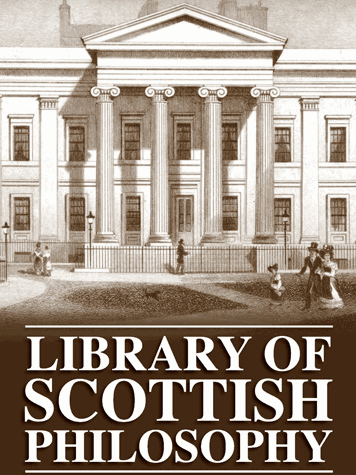


A collection of works published by Lady Mary Shepherd, brought together in one volume with an introduction by the editor and published as part of the Library of Scottish Philosophy series.

This volume — a companion to Thomas Reid: Selected Philosophical Writings (2012) — makes available material from Thomas Reid's autograph manuscripts and student notes of his lectures. It includes an introductory essay by Nicholas Wolterstorff.

Library of Scottish Philosophy volume containing selected writings of Henry Home, Lord Kames, judge, jurist and philosopher.

Known today mainly as a teacher of Adam Smith (1723–90) and an influence on David Hume (1711–76), Francis Hutcheson (1694–1746) was a first-rate thinker whose work deserves study on its own merit. Spanning his entire literary career, this collection brings together selections from Hutcheson's greater and lesser known works.

The selected writings chosen for this volume show how Scottish rhetorical textbooks were a practical extension of the philosophy of language developed by 18th century Scottish philosophers.

The aim of this comprehensive selection of his writings is to make the key elements of Reid's philosophical work available to a new generation of readers.

The Scottish Enlightenment provided the fledgling United States of America and its emerging universities with a philosophical orientation. This volume in the Library of Scottish Philosophy demonstrates the remarkable extent of this philosophical influence.

This volume contains selections from the philosophical writings of James Frederick Ferrier (1808-1864). Ferrier was the Professor of Moral Philosophy at the University of St Andrews between 1845 and 1864 and he was one of the earliest post-Hegelian British idealists.

The selections in this volume illustrate Brown's original ideas about mental science, cause and effect, emotions and ethics. They are preceded by an introduction situating Brown’s career and writings in their intellectual and historical context.

A philosopher and historian, Adam Ferguson occupies a unique place within eighteenth-century Scottish thought. Distinguished by a moral and historical bent, his work is framed within a teleological outlook that upholds the importance of action and virtue.

This volume illustrates the way political and social philosophers of 18th-century Scotland tried to answer the following question: 'What is, and what ought to be, the relationship between the modern market and stable, desirable social order?'

This volume concentrates on the period from the beginning of the 18th century to the latter part of the 20th. It is impossible to depict a single school of philosophical theology in Scotland across three centuries, yet several strains have been identified.

Dugald Stewart became one of the most influential academics in the eighteenth- and nineteenth-century European 'Republic of Letters'. This volume brings together some of Stewart's philosophical writings.

This anthology collects, for the first time in one volume, not only generous selections from each of Smith's books but also substantial selections from his other work, including his lectures on jurisprudence, his history and philosophy of science, his criticism and belles lettres, and his philosophy of language.

This collection of readings, the first of its kind, has been chosen with a view to displaying the variety, richness and strength of the Scottish Idealist tradition.

The philosophy of John Macmurray is only now receiving the attention it deserves. It is in the contemporary climate of dissatisfaction with individualism that Macmurray's emphasis on the relations of persons has come to the fore.

The first part of this selection — the first ever made from Beattie's prose writings — includes several key chapters from the Essay on Truth, along with extracts from all of Beattie's other works on moral philosophy. The second part of the selection is devoted to Beattie's contributions to literary criticism and aesthetics.

This volume brings together and provides contextual introductions to the most significant 18th century writing on the philosophy of art.

This collection of readings, the first of its kind, has been chosen with a view to displaying the variety, richness and strength of the Scottish philosophical tradition.